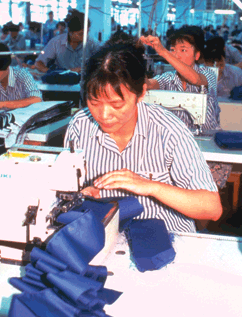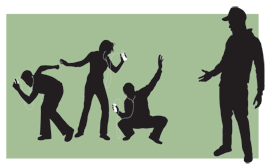|
Internationalist Magazine \ Vol. 2,
Issue 1 \ In Short
Afghans
Rock the Desert Vote
99
Problems, But Rich Ain’t One...
Colonel’s
Chicken and a Bucket of Blood, Please
Chechnya’s
Femmes Fatales
Deep
Lessons in Self-sacrifice
Least
Developed Pay Cost of Free Trade
For
Sale: The World
New
Incentives for Boot Camp
Million
Mao March
Dancehall
DJs Promote Homophobia
iWTF?
Afghans Rock the Desert Vote
The first democratic presidential
elections in Afghanistan should turn some heads on October 9,
2004. With 18 candidates in the race and 25,000 polling
stations across the country, Afghanis from as far as Pakistan
to Iranian refugee camps will turn out to vote. There are only
a few hurdles to clear in order to prove democracy that can
work in the country.
First, there is the mystery of
registered voters— there are more voters registered in the
country than there are eligible voters. While this voting
enthusiasm in Afghanistan has shamed elections in most
established democracies, it raises concerns of voter fraud.
Estimates of eligible voters stood around 9.8 million. This
number was hastily increased to 10.5 million by authorities
when registration numbers climbed to 9.9 million (and
continues to rise, now at about 10.5million in the middle of
September). In hopes of remedying possible voter fraud and in
the absence of identity documentation for most Afghani
citizens, voters will be required to give fingerprints at the
poles.
Another unorthodox characteristic of these elections
is the method of educating mostly illiterate voters. Cartoons
and info-graphics tell citizens how to register, and ballots
show pictures and symbols to identify the candidates.
State-sponsored radio is also getting out the word, but
finding enough literate staff for voting centers has been a
problem. And how will all the election materials be
transported in a country with few roads and weak
infrastructure? Jeeps, pick-ups, four-wheel drives,
helicopters, airplanes, horses, and donkeys will do the
job.
The biggest concern leading up to
the election is security, as the U.N. has reported that 12
deaths and 30 injuries have occurred in “election-related
violence” in the nine months of voter registration, not to
mention many more deaths involving militant rebel groups who
hope to disrupt the election. Along with the Taliban, several
other rebel factions and insurgents are reportedly forming
alliances in hopes of countering what they see as Western
influence and threats to their power.
While no one expects
the elections to run smoothly, the fact that they are
happening at all is a victory for the voices of the Afghani
people, particularly women, who comprise 41.3% of the vote and
are a traditionally marginalized group. Come October 9th, we
will see if democracy is victorious in Afghanistan, a prospect
that many Afghani people never thought possible.
—Karen
Miller
 99 Problems, But Rich Ain’t One... 99 Problems, But Rich Ain’t One...
Although the United States is now
three times richer than at the end of World War II, our
citizens don’t seem to be much happier. Could more sex be the
solution? According the rapidly expanding field of so-called
“happiness economists,” it could.
The National Bureau of Economic
Research recently published a paper entitled “Money, Sex, and
Happiness: An Empirical Study,” which assigns dollar amounts
to the happiness level derived from sexual activity. It is
based on the research of David Blanchflower of Dartmouth
College and Andrew Oswald of the University of Warwick, who
compiled the levels of sexual activity and happiness of 16,000
individuals. Measuring happiness as the “degree to which an
individual judges the overall quality of life as favorable,”
Blanchflower and Oswald assume that people can decide how
happy they feel. Using econometrics equations, the professors
estimate increasing romps between the sheets from once a month
to once a week is equivalent to an annual addition of $50,000
in income for Americans. While not clear whether happiness
begets more sex anyway, there does appear to be a clear
relationship between the two.
—Rachel Hynes
Colonel’s Chicken and a
Bucket of Blood, Please
 People for the Ethical Treatment of Animals
(P.E.T.A.), the largest animal rights organization in the
world, may just gross us out before provoking deep thoughts on
how to ethically treat animals. In a protest against alleged
slaughter abuses by KFC suppliers, a new campaign gimmick
called “Bucket of Blood” features a blood-spattered Colonel
Sanders brutally slaughtering a chicken. You might not want to
let the kids look inside, because instead of fried chicken you
will find fake blood, bones, and a bloodied plastic
chicken—what P.E.T.A. likes to call “pushing the envelope a
little further.” People for the Ethical Treatment of Animals
(P.E.T.A.), the largest animal rights organization in the
world, may just gross us out before provoking deep thoughts on
how to ethically treat animals. In a protest against alleged
slaughter abuses by KFC suppliers, a new campaign gimmick
called “Bucket of Blood” features a blood-spattered Colonel
Sanders brutally slaughtering a chicken. You might not want to
let the kids look inside, because instead of fried chicken you
will find fake blood, bones, and a bloodied plastic
chicken—what P.E.T.A. likes to call “pushing the envelope a
little further.”
—Karen Miller
 Chechnya’s Femmes Fatales Chechnya’s Femmes Fatales
Dressed from head-to-toe in black
and wearing a “martyr’s belt” filled with explosives, Chechen
women terrorists are gaining world-wide attention and creating
problems for counterterrorist experts. These women have
participated in many of the Chechen militants’ campaigns,
including the bombings of two Russian airliners and a recent
siege at a school in Northern Ossetia.
They are seen as assets as they do
not fit the terrorist profile; they are often able to slip by
security guards who are hesitant to search them for reasons of
modesty. Known as “black widows,” many of these women have
lost brothers, fathers, and husbands in the war with Russia
and claim to have nothing left to lose.
Feelings in Russia
towards these women are mixed. Aslambek Aslakhanov, a member
of the Russian parliament, has said such attacks are “not
characteristic of Chechens,” and claims the terrorists are
using the women. Parliament members believe these women have
been zombirovaniye, an expression meaning “turned into
zombies.” Stories abound of rape, drugs, and even women being
sold into terrorism.
—Rachel Hynes
Deep Lessons in
Self-sacrifice
 Think you know what sacrifice is? Well you
may be able to learn a thing or two from Tapawsiary Bapu, a
37-year-old Indian Hindu holy man who buried himself in the
ground from the neck down for 10 days. Bapu’s mission was to
fully devote himself to meditation, and supporters shown in
this picture praise the man with flowers and offerings. So
next time you are having trouble sitting still or
concentrating, remember Bapu, and go bury yourself in a
hole. Think you know what sacrifice is? Well you
may be able to learn a thing or two from Tapawsiary Bapu, a
37-year-old Indian Hindu holy man who buried himself in the
ground from the neck down for 10 days. Bapu’s mission was to
fully devote himself to meditation, and supporters shown in
this picture praise the man with flowers and offerings. So
next time you are having trouble sitting still or
concentrating, remember Bapu, and go bury yourself in a
hole.
—Karen Miller
Least Developed Pay Cost of Free
Trade
 The advancement of free trade is being
questioned and protested by many small developing countries
this year as the expiration of worldwide apparel quotas ends
this December. The apparel quotas set limits on the amount of
clothing and textiles that can be imported from any one
country. If the 30-year-old regime of quotas is lifted, the
apparel industry is likely to be dominated by a small handful
of the largest and most efficient countries, with China
topping the list. Following the laws of free trade, this
colossal change in the worldwide distribution of manufacturing
would cause textile-importing giants like the U.S. and Europe
to import exclusively from countries with the lowest wages,
modern factories, and strong infrastructure. While this may be
seen as a favorable outcome to free trade advocates, it cannot
be ignored that millions of workers and companies from
lesser-equipped countries will go out of business and that
whole economies will be in jeopardy. The advancement of free trade is being
questioned and protested by many small developing countries
this year as the expiration of worldwide apparel quotas ends
this December. The apparel quotas set limits on the amount of
clothing and textiles that can be imported from any one
country. If the 30-year-old regime of quotas is lifted, the
apparel industry is likely to be dominated by a small handful
of the largest and most efficient countries, with China
topping the list. Following the laws of free trade, this
colossal change in the worldwide distribution of manufacturing
would cause textile-importing giants like the U.S. and Europe
to import exclusively from countries with the lowest wages,
modern factories, and strong infrastructure. While this may be
seen as a favorable outcome to free trade advocates, it cannot
be ignored that millions of workers and companies from
lesser-equipped countries will go out of business and that
whole economies will be in jeopardy.
Countries that
will suffer from the massive change include Cambodia, the
Dominican Republic, Bangladesh, Jamaica, and Sri Lanka, with
estimates at around 30 million workers in dozens of developing
countries losing jobs. In 1974 the Multi-Fiber Arrangement
(MFA) gave 47 nations each a share of the market for clothing
and textiles. Originally, the quotas were meant to protect
declining clothing and textile industries in developing
countries, but in reality this guaranteed market access
allowed countries with no existing apparel industry to start
exporting these goods. With the impossibility of competing
with major exporters like China, what remains to be determined
in these lesser developed countries is where the laws of free
trade will place these countries in the global
marketplace.
—Karen Miller
For Sale: The World
Ever wanted to own an
island? How about a continent? Even if you’re not Alexander
the Great, the Nakheel Corporation of Dubai has made this
dream a reality. The  company is building a series of
man-made islands shaped like the continents of the world about
three miles off the coast of the United Arab Emirates. The
continents will be divided into 300 smaller artificial islands
and will be sold to developers starting at nearly $7 million
apiece. The cost to build the World is a mere $1.8 billion and
will be completed by the end of 2005. While it will take
longer than six days to create, this world can at least boast
that it has beach resorts on Antarctica. company is building a series of
man-made islands shaped like the continents of the world about
three miles off the coast of the United Arab Emirates. The
continents will be divided into 300 smaller artificial islands
and will be sold to developers starting at nearly $7 million
apiece. The cost to build the World is a mere $1.8 billion and
will be completed by the end of 2005. While it will take
longer than six days to create, this world can at least boast
that it has beach resorts on Antarctica.
—Nick
Edwards
New Incentives for Boot Camp
If you think that money for college,
specialized training, and a pension plan are the only benefits
available to America’s soldiers for their sweat and sacrifice
in defending our nation, Uncle Sam has one more trick up his
sleeve. Add plastic surgery to the list, because if a free nip
and tuck or breast enlargement can’t boost morale, then the
Pentagon has apparently been spending the largest defense
budget in the world frivolously.
Active service
members, their immediate family, and military retirees are
eligible for as many free face-lifts, nose jobs, liposuction,
or breast implants as they would like at a time when body
armor and ammo are in short supply. In the last three years,
military doctors have performed over 400 breast enlargements
and 1,600 liposuctions. But when compared to the 280,000
breast implants and 385,000 liposuctions Americans racked up
in 2003, taxes for our military tummy-tuckers may not be the
most worrisome place that Americans are spending their
money.
—Karen Miller
Million Mao March
“If everyone were like Mao, the
world would be a beautiful place,” explains Chinese artist
Wang Wenhai.
The 53-year-old, self-proclaimed “Yanan
Clay Sculpture King”, plans to craft the late communist
ruler’s likeness into 25,000 petite statues, or Mini Maos. If
time allows (the 1,300 statues already completed have occupied
the majority of the sculptor’s 30-year career), the 25,000
Mini Maos will line the 6,000-mile trail blazed in 1934 by
communists fleeing rural bases in Southern China. Once
installed, the repetitious sculptures could prove a boon to
China’s growing cultural tourism industry. But at current
rates of production, don’t expect to visit the statues before
the year 2580.
—Chris Hlavaty
Dancehall DJs Promote
Homophobia
 What ever happened to singing about love,
smoking pot, and getting together to feel alright? Leading a
new trend in reggae, DJs such as Beenie Man, Bad Vybz, and
Elephant Man are instead filling thier songs with angry lyrics
that promote discrimination against gays. This homophobic
reggae is mostly found in dancehall reggae, in which the words
are half-spoken and half-sung over a pumped up bass, with
lyrics rife with derogatory references to gay people like
“chi-chi men” or “batty boys” (slang for buttocks). What ever happened to singing about love,
smoking pot, and getting together to feel alright? Leading a
new trend in reggae, DJs such as Beenie Man, Bad Vybz, and
Elephant Man are instead filling thier songs with angry lyrics
that promote discrimination against gays. This homophobic
reggae is mostly found in dancehall reggae, in which the words
are half-spoken and half-sung over a pumped up bass, with
lyrics rife with derogatory references to gay people like
“chi-chi men” or “batty boys” (slang for buttocks).
Gay rights organizations such as the British Outrage
have been leading the campaign against these DJs, even calling
for Scotland Yard to investigate Beenie Man for “inciting
murder.” They have succeeded in causing show cancellations
from Miami to Berlin. Virgin Records, Beenie Man’s label, has
declined to make him available for an interview and issued
press releases denying their involvement with such
songs.
Speaking to the New York Times, a leading reggae
music executive said the lyrics could also be strategic. He
says it not only grabs the audiences’ attention, but if other
DJs don’t respond, they can be labeled gay.
Homophobia
is not unusual in Jamaica, where some gay residents still fear
the possibility of discrimination and persecution under the
1864 buggery laws that are a part of the Offense Against the
Person Act. The penalty is ten years of imprisonment with hard
labor, and the majority of those prosecuted are adult men
suspected of having anal sex. Although discriminated against
in society at large, lesbians are not currently discriminated
against by law.
—Rachel Hynes
 iWTF? iWTF?
They are everywhere you go, on
street corners, in the library, at the mall, and in the
office, those illustrious white boxes known as the iPod. With
the sale of almost 3 million over the past year and a half,
the iPod is rapidly becoming one of the most prolific cultural
icons of the 21st century. Just last winter, Jonathan Ive,
original designer of the iMac and iPod, was named the most
influential person in British culture over J.K. Rowling,
author of the hit Harry Potter series. Despite the ludicrous
advertising campaign, iPods have created a new cultural style
around the world. More than a status symbol, a fad, or a
fashion statement, iPods may be the cultural icon of the 21st
century.
—Erin Schneider |
 |